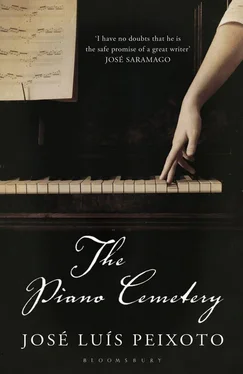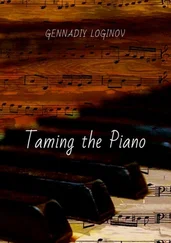‘Don’t you hear me? Don’t you hear me?’
As I let go of her, she gave up on eating and began to clear the table. The plates piled up in her hands. The top plate had the cutlery and the fish-bones, tipped from the other plates. There was silence. Still she didn’t look at me, as though I didn’t exist. I waited for her to approach the sink, and with a slap knocked the plates from her hands.
Elisa began to cry. Our daughters’ husbands looked at places that didn’t exist. Francisco looked at his mother. Our daughters got closer to one another, sisters again, as though whatever had separated them had lost any significance. In Marta’s face, next to Maria, I could see that she had forgiven whatever secret had hurt her, she hadn’t forgotten, but she had forgiven. And she was looking only at me. My wife, crouched down, was gathering up dirty cutlery and shards of broken plates.
I had only been ill a few months, but already I wasn’t working. At the workshop I’d sit on a pile of planks of wood. Francisco was slowly ceasing to be a lad and starting to be a man. His age was like that diffuse time of day when afternoon begins to mingle with night, it seems like it’s afternoon, it seems like it’s night, and it’s no longer afternoon, and it’s not yet night.
There was one day I left the workshop to make my way slowly homewards to rest. I stopped at the taberna . I drank. Weeks had passed since my last glass of wine, the doctor forbidding me, the doctor looking me in the eye and forbidding me. I drank three glasses, four, and for a moment it was like when I still had a future. I arrived home, avoided my wife, and went into Francisco’s room because I knew no one would come to look for me there. I lay down on his bed. The pillow was too low.
When Francisco arrived, after his run, he found me sleeping. He woke me, and from my breath or my voice, or from what I said to him, he knew right away that I had been drinking. Against my grumbles, he helped me up. And he seemed to be already a man, because he said to me:
‘Are you afraid of dying?’
And he seemed to be still a boy because, when I was up on my feet, he wanted to hug me. I said to him:
‘I don’t really hug.’
We stood there facing each other, still in conflict, with our arms out, impossible to make out which of us was the man and which the boy, almost hugging.
Even Íris, little, concerned with her dolls, knows that a day that moves as this one does towards evening can only be a Friday. She doesn’t know the word ‘Friday’, but she knows what it means. It is the end of the afternoon — the apotheosis. Maria has arrived, with all the strength in her body fading. Standing under my wife’s arms, Ana takes off her smock. Ana has her exercise books on the kitchen table to solve some divisions. On top of the refrigerator, the wireless pours out piano music. It is like an open tap, forgotten, losing a thread of water that isn’t noticed, that can barely be seen. Maria’s husband has arrived, short and angry, enemies watching him from all directions. He has enemies on top of the kitchen cupboards, he has enemies behind the plates drying over the sink, he has transparent enemies that mingle with the tulle curtains and tremble with them, passed through by the breeze that the windows let in — the end of the afternoon.
It has always been like this. For some incomprehensible reason, my wife doesn’t like — has never liked — to talk about what she’s got heating up in the pans on the stove. Maria, with her thin voice, asks:
‘What’s for dinner?’
My wife replies:
‘Look, it’s food, all right?’
Maria says nothing, because she knows it has always been like this. She forgets about it. She walks over to some place she knows in her thoughts. All through the kitchen there is the smell of food being made. She remembers. She approaches the stove, lifts the lid off a pan, and without any expression looks inside.
Íris is leaning right up against Ana because she is waiting for her to finish her homework so that they can play together. Her father, passing her, trips, and shouts:
‘Leave your sister in peace.’
Maria is startled by the shout, but she says nothing. She raises her eyes, and lowers them. She walks towards the door and pulls Íris by the arm. She wants to take her to the living room. Íris is small and stabs her buckle-shoes into the floor, she objects and flails around. On the other side of the kitchen Maria’s husband raises his chin and his voice gets thicker:
‘What is it you’re doing?’
It has begun.
Maria could have told him with all sincerity that she is taking her to the living room, which was what she understood he wanted, but she is unable to because his voice has wounded her. This is why she also has to reply to him rudely, she has to hide the fact that she has been hurt and she has to hurt him, too. This is why she replies with some haughty phrase, rudely, to provoke him, to strike him.
Piano music fills the few empty corners of the kitchen. Maria’s husband, as if threatening, says:
‘Well, well, well.’
The piano music changes colour. It turns red. Maria doesn’t let it rest.
‘Well what?’
Ana gets down from her chair. The exercise book is left open on the table. She takes her sister’s hand and the two of them leave the kitchen.
Maria’s husband has blood flowing through the veins in his temples. He is alive. As if trying to restrain himself:
‘You’re not talking to your father now, you know.’
My wife can’t keep silent:
‘And what does her father have to do with anything?’
He turns his head the other way:
‘Now it’s both of you? You keep quiet! No one’s talking to you.’
My wife can’t, she demands a reply, pulls him by the arm:
‘What does her father have to do with anything?’
He frees himself:
‘Ai ai ai. .’
My wife can’t, she approaches him again:
‘Well? What does her father have to do with anything?’
He turns suddenly — fury — and pushes her. My wife knocks into the sink with her waist, falls. She’s sitting on the floor.
‘Leave me alone!’
Maria crosses the kitchen to where he is, grabs his arm and twists it behind his back. At the same speed she takes him out to the corridor. Taller, stronger, she takes him. He is like a muted, anxious child, afraid of speaking and making it worse, afraid of reacting and making it worse. Maria opens the front door and throws him out into the shadows of the staircase. She bangs the door closed, as though firing a shot.
She waits. Her breathing. Maybe he’ll knock at the door. He didn’t take his key, he didn’t take his jacket, he didn’t take his wallet. She waits. She hears the banging of the door to the street. She lowers her eyelids. Her breathing. She walks slowly towards the kitchen and finds my wife on her feet already. They don’t say anything. Maria knows that if she were to go to the window she would see her husband heading away in one direction or other. She doesn’t want to, she’s no longer interested. It’s still rage, burning. After a time she goes to the window. Perhaps she’ll still see him. She doesn’t see him. He has disappeared. The street is deserted. And that’s that.
When Marta became pregnant, we were pleased. Marta was twenty years old, she still believed in everything and she was thin. Marta’s husband was little more than a boy, he didn’t look at other women and he smiled a lot when he heard the news. My wife and I received the news that we were going to be grandparents very naturally. We had a twenty-year-old daughter, and we were going to be grandparents.
At four months, the doctor recommended rest. That was he word he used. To my wife’s satisfaction, for the remainder of the time Marta moved to our house. Her husband would arrive at night and have dinner with us, and we would have solemn conversations, and then he would go to bed with Marta. For those months Maria left her bed to sleep in Francisco’s room.
Читать дальше












